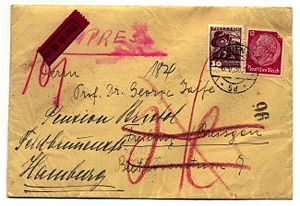
Mixed franking
Encyclopedia

Philately
Philately is the study of stamps and postal history and other related items. Philately involves more than just stamp collecting, which does not necessarily involve the study of stamps. It is possible to be a philatelist without owning any stamps...
, a mixed franking
Franking
Franking are any and all devices or markings such as postage stamps , printed or stamped impressions, codings, labels, manuscript writings , and/or any other authorized form of markings affixed or applied to mails to qualify them to be postally serviced.-Franking types and...
is an occurrence of postage stamp
Postage stamp
A postage stamp is a small piece of paper that is purchased and displayed on an item of mail as evidence of payment of postage. Typically, stamps are made from special paper, with a national designation and denomination on the face, and a gum adhesive on the reverse side...
s of more than one country or issuing entity on a single cover
Cover (philately)
In philately, the term cover pertains to the outside of an envelope or package with an address, typically with postage stamps that have been cancelled and is a term generally used among stamp and postal history collectors. The term does not include the contents of the letter or package, although...
— or the occurrence of postage stamps of more than one currency
Currency
In economics, currency refers to a generally accepted medium of exchange. These are usually the coins and banknotes of a particular government, which comprise the physical aspects of a nation's money supply...
of a country or issuing identity on a single cover. Since nearly all countries of the world have agreed to deliver each other's mail
Mail
Mail, or post, is a system for transporting letters and other tangible objects: written documents, typically enclosed in envelopes, and also small packages are delivered to destinations around the world. Anything sent through the postal system is called mail or post.In principle, a postal service...
, it is unusual to need more than the stamps of the originating country; valid mixed frankings are uncommon and valued by collectors.
Before the advent of the Universal Postal Union
Universal Postal Union
The Universal Postal Union is an international organization that coordinates postal policies among member nations, in addition to the worldwide postal system. The UPU contains four bodies consisting of the Congress, the Council of Administration , the Postal Operations Council and the...
in 1874, sending international mail was quite an adventure; it might be necessary to affix the stamps of the destination country in addition to those of the origin, and in the worst cases, possibly for several other countries along the way. Sometimes the letter was held until the recipient brought stamps, they were affixed and cancelled, and the result handed to the recipient. Since this only happened during the first few decades of stamp usage, and only for the few letters that were sent great distances, very few covers have survived. For some combinations, only single examples have survived, and command spectacular prices among collectors.
Another form of mixed franking occurs in transitional periods, either as a way to help the public use up the stamps of a defunct government, or involuntarily as a propaganda tool.
An example of involuntary mixed franking is when Germany
Germany
Germany , officially the Federal Republic of Germany , is a federal parliamentary republic in Europe. The country consists of 16 states while the capital and largest city is Berlin. Germany covers an area of 357,021 km2 and has a largely temperate seasonal climate...
took over Austria
Austria
Austria , officially the Republic of Austria , is a landlocked country of roughly 8.4 million people in Central Europe. It is bordered by the Czech Republic and Germany to the north, Slovakia and Hungary to the east, Slovenia and Italy to the south, and Switzerland and Liechtenstein to the...
in the Anschluss
Anschluss
The Anschluss , also known as the ', was the occupation and annexation of Austria into Nazi Germany in 1938....
in 1938; during the several months while Austrian stamps were still accepted, Austrians sending mail to Germany were required to include a German stamp on the envelope.
Sometimes illegitimate mixed frankings occur when a postal user adds another country's stamps to an envelope just for fun. Many countries' postal regulation require clerks to refuse to handle these, even if the correct postage of the country is present, because they slow down the sorting process, but such covers can still get through the system.

